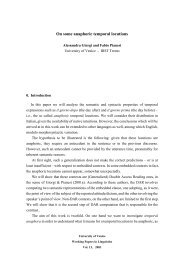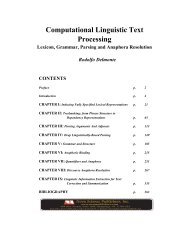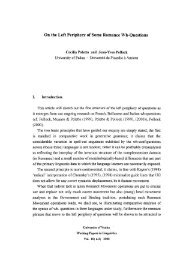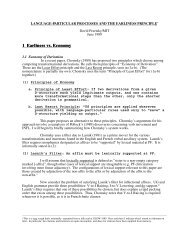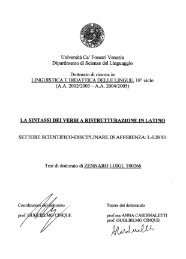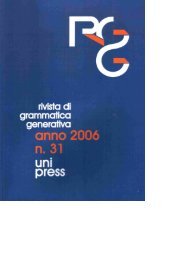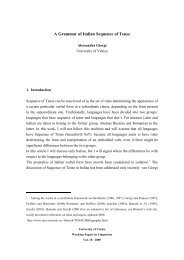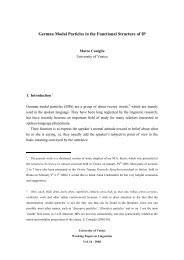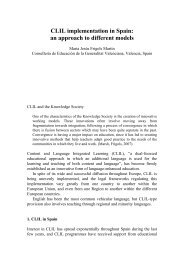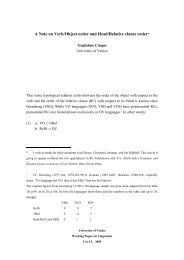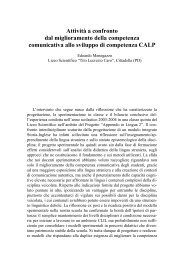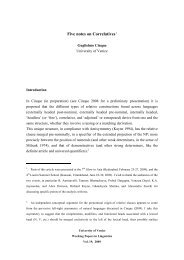1 GAPS, GHOSTS AND GAPLESS RELATIVES IN ... - ling.auf.net
1 GAPS, GHOSTS AND GAPLESS RELATIVES IN ... - ling.auf.net
1 GAPS, GHOSTS AND GAPLESS RELATIVES IN ... - ling.auf.net
Create successful ePaper yourself
Turn your PDF publications into a flip-book with our unique Google optimized e-Paper software.
the ultimate landing site for caseless prepositional objects, but only an intermediate transit<br />
site for case-marked prepositional objects. In sum: formal registers of English have no<br />
caseless counterparts of which/who, and so don’t allow gapless relatives with which/who;<br />
informal registers have both case-marked and caseless counterparts of which/who, and use<br />
of caseless relative pronouns gives rise to gapless relatives 11 .<br />
A further difference is that formal registers only allow ghosting of the locative<br />
preposition to/at in wh-clauses like those in (28-29), whereas informal registers allow any<br />
preposition to be ghosted in gapless relatives. Why should this be? As noted earlier, Collins<br />
(2007) claims that movement to spec-PP is only possible for constituents which incorporate<br />
the light nouns PLACE and home, and it is natural to suppose that the only prepositions<br />
which these will only serve as the complement of are locative to/at. But in spoken registers,<br />
the pronoun “which” is a light noun that can move to spec-PP, and since “which” has no<br />
PLACE component in its meaning, it can occur as the object of an unrestricted range of<br />
prepositions.<br />
5. Predicate Ghosting<br />
Although the Prepositional Ghosting analysis outlined in the previous section provides a<br />
plausible account of the majority of cases of gapless relatives in the BBE corpus, there<br />
remains a residue of 68/243 (28%) of gapless relatives which have a Topic-Comment<br />
interpretation and which seemingly prove problematic for any account which assumes<br />
Ghosting of a P or PP alone. In this section, however, we show that such sentences can also<br />
be given a Ghosting analysis (although with more than just a single P or PP ghosted).<br />
The kind of structures involved are the following:<br />
(48) a. You take Theo Walcott off and replace him with Rosicky, who Walcott’s a better<br />
player than Rosicky (Listener, Talk Sport Radio = 5f)<br />
b. You look at some of the other papers, who it’s not going to be just the ‘News of The<br />
World’ running dodgy practices (Reporter, Talk Sport Radio)<br />
c. He’s a fabulous player who, given the right conditions and the right management,<br />
we could be talking about one of the best players in the world (Sid Lowe, Talk<br />
Sport Radio = 11d)<br />
d. This is something that when you’re abroad, people are blown away by the level of<br />
interest in the lower leagues (Andy Brassell, BBC Radio 5)<br />
e. He’s got to stay free from injury, which he’s had a horrible time at all the clubs<br />
he’s been at (Andy Goldstein, Talk Sport Radio)<br />
f. Look at the passes (724 against 199), which Arsenal are generally known as a<br />
passing team (Terry Gibson, Sky Sports TV)<br />
g. Jenson did get held up, which you never put your best lap in on your first lap (David<br />
Croft, BBC Radio 5)<br />
i. All we’ve had so far are words, which frankly we need to see the numbers<br />
(Economics reporter, BBC Radio 5)<br />
For such structures it would seem implausible to posit that all that has happened is that a<br />
preposition has been ghosted, since none of the angle-bracketed prepositions in (48) below<br />
provides an appropriate paraphrase of (48a):<br />
(49) You take Theo Walcott off and replace him with Rosicky, who Walcott’s a<br />
better player than Rosicky <br />
16



